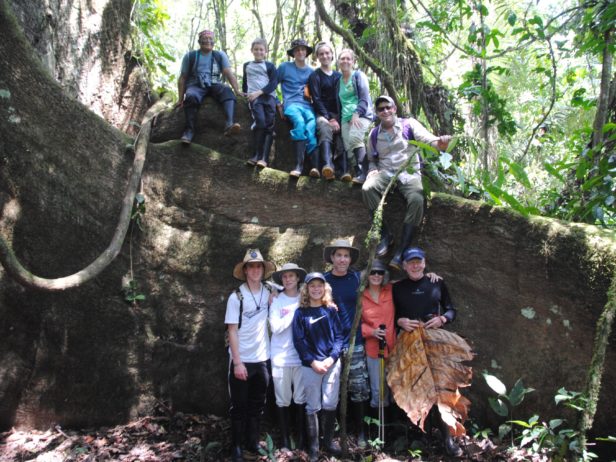 We all have a personal narrative, and listening to others’ stories helps us learn more about ourselves. My husband and I, our 4 adult children and 5 grandsons traveled to the basin of the Ecuadorian Amazon River where peace of mind is a natural commodity. It was a breath of fresh air to visit the indigenous Achuar people, as ecological mindfulness and family life are two of their top priorities. They number 6,000 and live on two million acres of ancestral territory, a remote area where they preserve their way of life with little outside influence.
We all have a personal narrative, and listening to others’ stories helps us learn more about ourselves. My husband and I, our 4 adult children and 5 grandsons traveled to the basin of the Ecuadorian Amazon River where peace of mind is a natural commodity. It was a breath of fresh air to visit the indigenous Achuar people, as ecological mindfulness and family life are two of their top priorities. They number 6,000 and live on two million acres of ancestral territory, a remote area where they preserve their way of life with little outside influence.
 The Achuar use limited tourism to protect their land. As custodians of the rain forest, they opened Kapawi Lodge & Reserve in 1996, which was our destination. It was a long trip from Los Angeles to Quito, Ecuador. After touring the city and a good night’s sleep, we continued our journey traveling by bus, puddle jumper planes and motorized canoes.
The Achuar use limited tourism to protect their land. As custodians of the rain forest, they opened Kapawi Lodge & Reserve in 1996, which was our destination. It was a long trip from Los Angeles to Quito, Ecuador. After touring the city and a good night’s sleep, we continued our journey traveling by bus, puddle jumper planes and motorized canoes.
 The United Nations named Kapawi one of the top five outstanding environmental conservation projects in the world. The sheltered lagoon acts as a nesting area for birds, frogs, caiman, caterpillars, moths, spiders, and butterflies. We enjoyed living amid the soothing sounds of nature and taking showers with water warmed by the sun.
The United Nations named Kapawi one of the top five outstanding environmental conservation projects in the world. The sheltered lagoon acts as a nesting area for birds, frogs, caiman, caterpillars, moths, spiders, and butterflies. We enjoyed living amid the soothing sounds of nature and taking showers with water warmed by the sun.
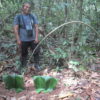 No matter where we live, we love our family and want to take care of them. Away from conventional civilization, the Achuar have to be resourceful and self sufficient as they carry out their responsibilities. They sustain their family groups through hunting and gardening.
No matter where we live, we love our family and want to take care of them. Away from conventional civilization, the Achuar have to be resourceful and self sufficient as they carry out their responsibilities. They sustain their family groups through hunting and gardening.
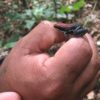 While hiking in the beautiful rain forest, we discovered how the jungle is the pharmacy, grocery and hardware store that provides for the villages. And we heard stories about the culture’s ancient rituals to access dreams and visions, using spirituality to integrate them into daily life.
While hiking in the beautiful rain forest, we discovered how the jungle is the pharmacy, grocery and hardware store that provides for the villages. And we heard stories about the culture’s ancient rituals to access dreams and visions, using spirituality to integrate them into daily life.
 We were taught by our guide Simone and interpreter Lorena Ledesma, how to identify medicinal plants, fish with a string and hook, apply face paint, find our spirit animal, make rope out of plants, use a blow gun and trap animals. We had a chance to bird watch, paddle kayaks, see pink river dolphins, spot animals, take night hikes, examine insects, share school supplies and play soccer with the local children, give candles and clothing to the communities.
We were taught by our guide Simone and interpreter Lorena Ledesma, how to identify medicinal plants, fish with a string and hook, apply face paint, find our spirit animal, make rope out of plants, use a blow gun and trap animals. We had a chance to bird watch, paddle kayaks, see pink river dolphins, spot animals, take night hikes, examine insects, share school supplies and play soccer with the local children, give candles and clothing to the communities.
 The Achuar live in communal houses built on dirt with a palm-thatched roof and open walls, divided along gender lines. Families typically rise at an early hour to drink guayusa, a caffeinated tea that comes from the holly tree native to the Amazon rainforest. It’s a time of day when parents teach their children skills while passing on traditions and values.
The Achuar live in communal houses built on dirt with a palm-thatched roof and open walls, divided along gender lines. Families typically rise at an early hour to drink guayusa, a caffeinated tea that comes from the holly tree native to the Amazon rainforest. It’s a time of day when parents teach their children skills while passing on traditions and values.
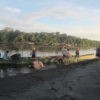 We met the local Shaman, whose grandson sat on his lap the whole time. He had several questions for Jared Sternberg, the owner of Gondwana Ecotours, who had taught English to the Achuar children. When the Shaman asked how we would feel if our grandsons wanted to work with the tribe, we agreed that would make us very proud.
We met the local Shaman, whose grandson sat on his lap the whole time. He had several questions for Jared Sternberg, the owner of Gondwana Ecotours, who had taught English to the Achuar children. When the Shaman asked how we would feel if our grandsons wanted to work with the tribe, we agreed that would make us very proud.
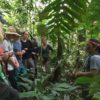 So what did I learn from this magical experience? Flights out of the Amazon are grounded because of rain and you can’t control Mother Nature. At 13, Achuar boys go into the forest to find arutam, the spirit of the forest and ancestors who reveal their life calling – a rite of passage like our grandsons’ Bar Mitzvahs. Being in a world entirely different from ours provides insight into familiar life. The best antidote to stress is to go where there is no Internet connection. And instead of virtual texting with family, I prefer to cross the communication divide through shared real adventures.
So what did I learn from this magical experience? Flights out of the Amazon are grounded because of rain and you can’t control Mother Nature. At 13, Achuar boys go into the forest to find arutam, the spirit of the forest and ancestors who reveal their life calling – a rite of passage like our grandsons’ Bar Mitzvahs. Being in a world entirely different from ours provides insight into familiar life. The best antidote to stress is to go where there is no Internet connection. And instead of virtual texting with family, I prefer to cross the communication divide through shared real adventures.









